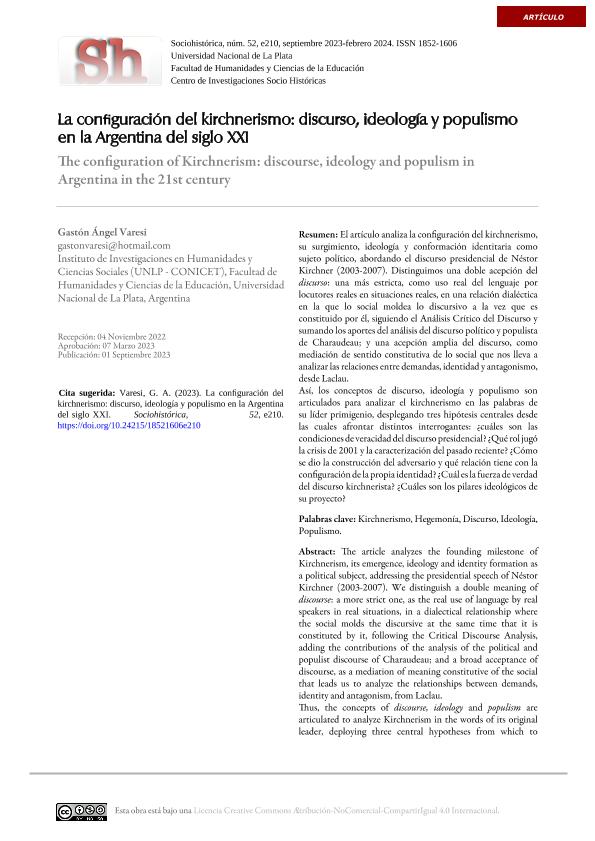Mostrar el registro sencillo del ítem
dc.contributor.author
Varesi, Gastón Angel

dc.date.available
2024-04-10T13:34:37Z
dc.date.issued
2023-09
dc.identifier.citation
Varesi, Gastón Angel; La configuración del kirchnerismo: discurso, ideología y populismo en la Argentina del siglo XXI; Universidad Nacional de La Plata. Facultad de Humanidades y Ciencias de la Educación. Instituto de Investigaciones en Humanidades y Ciencias Sociales; Sociohistórica; 52; 9-2023; 1-20
dc.identifier.issn
1852-1606
dc.identifier.uri
http://hdl.handle.net/11336/232648
dc.description.abstract
El artículo analiza la configuración del kirchnerismo, su surgimiento, ideología y conformación identitaria como sujeto político, abordando el discurso presidencial de Néstor Kirchner (2003-2007). Distinguimos una doble acepción del discurso: una más estricta, como uso real del lenguaje por locutores reales en situaciones reales, en una relación dialéctica en la que lo social moldea lo discursivo a la vez que es constituido por él, siguiendo el Análisis Crítico del Discurso y sumando los aportes del análisis del discurso político y populista de Charaudeau; y una acepción amplia del discurso, como mediación de sentido constitutiva de lo social que nos lleva a analizar las relaciones entre demandas, identidad y antagonismo, desde Laclau. Así, los conceptos de discurso, ideología y populismo son articulados para analizar el kirchnerismo en las palabras de su líder primigenio, desplegando tres hipótesis centrales desde las cuales afrontar distintos interrogantes: ¿cuáles son las condiciones de veracidad del discurso presidencial? ¿Qué rol jugó la crisis de 2001 y la caracterización del pasado reciente? ¿Cómo se dio la construcción del adversario y qué relación tiene con la configuración de la propia identidad? ¿Cuál es la fuerza de verdad del discurso kirchnerista? ¿Cuáles son los pilares ideológicos de su proyecto?
dc.description.abstract
The article analyzes the founding milestone of Kirchnerism, its emergence, ideology and identity formation as a political subject, addressing the presidential speech of Néstor Kirchner (2003-2007). We distinguish a double meaning of discourse: a more strict one, as the real use of language by real speakers in real situations, in a dialectical relationship where the social molds the discursive at the same time that it is constituted by it, following the Critical Discourse Analysis, adding the contributions of the analysis of the political and populist discourse of Charaudeau; and a broad acceptance of discourse, as a mediation of meaning constitutive of the social that leads us to analyze the relationships between demands, identity and antagonism, from Laclau. Thus, the concepts of discourse, ideology and populism are articulated to analyze Kirchnerism in the words of its original leader, deploying three central hypotheses from which toapproach to different questions: what are the conditions of veracity of the presidential speech? What role did the 2001 crisis play and the characterization of the recent past? How did the construction of the adversary take place and how was it related to the configuration of the own identity? What is the force of truth of the Kirchnerist discourse? Which are the ideological pillars of its project?
dc.format
application/pdf
dc.language.iso
spa
dc.publisher
Universidad Nacional de La Plata. Facultad de Humanidades y Ciencias de la Educación. Instituto de Investigaciones en Humanidades y Ciencias Sociales
dc.rights
info:eu-repo/semantics/openAccess
dc.rights.uri
https://creativecommons.org/licenses/by-nc-sa/2.5/ar/
dc.subject
KIRCHNERISMO
dc.subject
HEGEMONÍA
dc.subject
DISCURSO
dc.subject
POPULISMO
dc.subject.classification
Sociología

dc.subject.classification
Sociología

dc.subject.classification
CIENCIAS SOCIALES

dc.title
La configuración del kirchnerismo: discurso, ideología y populismo en la Argentina del siglo XXI
dc.title
The configuration of Kirchnerism: discourse, ideology and populism in Argentina in the 21st century
dc.type
info:eu-repo/semantics/article
dc.type
info:ar-repo/semantics/artículo
dc.type
info:eu-repo/semantics/publishedVersion
dc.date.updated
2024-03-21T16:00:20Z
dc.journal.number
52
dc.journal.pagination
1-20
dc.journal.pais
Argentina

dc.journal.ciudad
La Plata
dc.description.fil
Fil: Varesi, Gastón Angel. Consejo Nacional de Investigaciones Científicas y Técnicas. Centro Científico Tecnológico Conicet - La Plata. Instituto de Investigaciones en Humanidades y Ciencias Sociales. Universidad Nacional de La Plata. Facultad de Humanidades y Ciencias de la Educación. Instituto de Investigaciones en Humanidades y Ciencias Sociales; Argentina
dc.journal.title
Sociohistórica
dc.relation.alternativeid
info:eu-repo/semantics/altIdentifier/doi/https://doi.org/10.24215/18521606e210
dc.relation.alternativeid
info:eu-repo/semantics/altIdentifier/url/https://www.sociohistorica.fahce.unlp.edu.ar/article/view/she210
Archivos asociados
